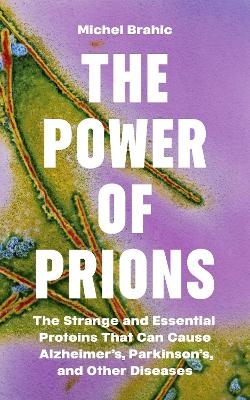
The Power of Prions
The Strange and Essential Proteins That Can Cause Alzheimer’s, Parkinson’s, and Other Diseases
Seiten
2024
Princeton University Press (Verlag)
978-0-691-25238-4 (ISBN)
Princeton University Press (Verlag)
978-0-691-25238-4 (ISBN)
- Lieferbar (Termin unbekannt)
- Portofrei ab CHF 40
- Auch auf Rechnung
- Artikel merken
The remarkable family of proteins that can make us very ill but can also be linked to long-term memory, immunity, and the origin of life.
The remarkable family of proteins that can make us very ill—but can also be linked to long-term memory, immunity, and the origin of life
Over the last decade, scientists have discovered the importance and widespread presence in the body of a remarkable family of proteins known as prion proteins. Research links various types of prion proteins to neurodegenerative diseases such as Parkinson’s and Alzheimer’s—and this has fueled the search for new drugs that could halt the progression of these terrible disorders. Other discoveries have revealed the essential roles prion proteins play in memory and immunity, and—in an extraordinary finding—the part they may have played in the beginnings of life on our planet. In this engaging and accessible book, Michel Brahic tells the story of these amazing and versatile proteins.
Brahic, a leading researcher on diseases of the central nervous system, first describes the discovery of prions and their role in infection, beginning with early work on the animal disease scrapie and a mysterious human illness in New Guinea, apparently transmitted by cannibalism. Prions were eventually identified and named by Stanley Prusiner in the 1980s. (Brahic tells us Prusiner’s alternate name for prion was “piaf.”) Prion proteins were then revealed as the cause of other illnesses, from “mad cow” disease and its human counterpart, Creutzfeldt-Jakob disease, to such noninfectious brain disorders as Parkinson’s and Alzheimer’s. While the prion proteins responsible for diseases are definitively “bad,” Brahic also explains that these abnormal prions are rare exceptions. Most of the time, prion proteins actually serve “good” and vital functions—and they may even have been present at the origin of life itself.
The remarkable family of proteins that can make us very ill—but can also be linked to long-term memory, immunity, and the origin of life
Over the last decade, scientists have discovered the importance and widespread presence in the body of a remarkable family of proteins known as prion proteins. Research links various types of prion proteins to neurodegenerative diseases such as Parkinson’s and Alzheimer’s—and this has fueled the search for new drugs that could halt the progression of these terrible disorders. Other discoveries have revealed the essential roles prion proteins play in memory and immunity, and—in an extraordinary finding—the part they may have played in the beginnings of life on our planet. In this engaging and accessible book, Michel Brahic tells the story of these amazing and versatile proteins.
Brahic, a leading researcher on diseases of the central nervous system, first describes the discovery of prions and their role in infection, beginning with early work on the animal disease scrapie and a mysterious human illness in New Guinea, apparently transmitted by cannibalism. Prions were eventually identified and named by Stanley Prusiner in the 1980s. (Brahic tells us Prusiner’s alternate name for prion was “piaf.”) Prion proteins were then revealed as the cause of other illnesses, from “mad cow” disease and its human counterpart, Creutzfeldt-Jakob disease, to such noninfectious brain disorders as Parkinson’s and Alzheimer’s. While the prion proteins responsible for diseases are definitively “bad,” Brahic also explains that these abnormal prions are rare exceptions. Most of the time, prion proteins actually serve “good” and vital functions—and they may even have been present at the origin of life itself.
Michel Brahic, an expert in viral and prion infections of the brain, is Professeur Honoraire at Institut Pasteur in Paris. He has been Directeur de Recherche at CNRS and Consulting Professor at Stanford University School of Medicine. His work has been published in Nature, Cell, New Scientist, and other journals.
| Erscheinungsdatum | 09.10.2024 |
|---|---|
| Zusatzinfo | 11 b/w illus. |
| Verlagsort | New Jersey |
| Sprache | englisch |
| Maße | 127 x 203 mm |
| Themenwelt | Geisteswissenschaften ► Psychologie |
| Medizin / Pharmazie ► Medizinische Fachgebiete | |
| Naturwissenschaften ► Biologie ► Humanbiologie | |
| Naturwissenschaften ► Biologie ► Zoologie | |
| ISBN-10 | 0-691-25238-6 / 0691252386 |
| ISBN-13 | 978-0-691-25238-4 / 9780691252384 |
| Zustand | Neuware |
| Informationen gemäß Produktsicherheitsverordnung (GPSR) | |
| Haben Sie eine Frage zum Produkt? |
Mehr entdecken
aus dem Bereich
aus dem Bereich
23 Techniken, um Stress abzubauen, Negativspiralen zu unterbrechen …
Buch | Softcover (2023)
FinanzBuch Verlag
CHF 25,20
produktiv sein ohne Stress – und mehr vom Leben haben
Buch | Softcover (2023)
dtv Verlagsgesellschaft
CHF 25,20
Wie Myrmecophile mit ihren Wirten interagieren
Buch | Softcover (2023)
Springer (Verlag)
CHF 97,95


